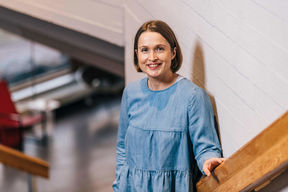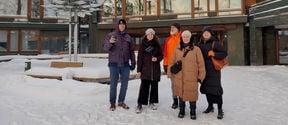Paula Jouhten seeks to replace oil-based chemistry by controlling the physiology of microbial cells

Jouhten was first inspired to pursue a career in science by her biology teacher at upper secondary school. She remembers a field trip to the Viikki Science Park in Helsinki as a significant moment in her life.
‘We met a scientist in Viikki who was studying potato viruses. It seemed to her the most fascinating thing in the world. I was really impressed by how enthusiastic she was about her work,’ says Jouhten.
At the time, genetic engineering research was on the rise. Jouhten began studying Bioprocess Engineering at the Helsinki University of Technology (merged into Aalto University in 2010). She received her D.Sc. in 2009.
Jouhten has since worked in several research positions at VTT Technical Research Centre of Finland, most recently for two years as a Research Team Leader of the Bioanalytics and Biological Data Science -team. She has also spent three years as a postdoctoral researcher and a Computational Biologist at the European Molecular Biology Laboratory (EMBL) in Heidelberg, Germany, and has done several shorter research visits to other laboratories abroad.
Towards a wider use of microbial cells
All built environments and human-made materials depend currently on oil-based chemistry. Jouhten's research group is using computational and experimental methods to develop solutions to control microbial physiology that would facilitate the use of microbial cells in applications. One of the key applications they have in mind is the replacement of oil-based chemistry on a large scale with compounds sustainably produced by microbes.
‘The metabolism of microbial cells has the potential to produce all the compounds we need to replace oil-based chemistry. However, there are still significant challenges to be overcome, and I want to be part of the solution,’ says Jouhten.
One of the biggest challenges is that microbial cells have not evolved to act as production factories for humanity. Their activity, which is governed by a complex regulatory system, is based on what has been beneficial for their survival and growth.
Therefore, even a successful new synthesis pathway will only produce a small drop of the desired compound in the cells, without substantial optimisation of the host cells. According to Jouhten, the optimisation of the host cells and thus the achievement of feasible production levels must be accelerated and streamlined. This will make the development of new production processes using microbial cells more attractive to industry and offer a real alternative to oil-based chemistry.
‘Currently, the process of optimising the production by microbial cells involves a lot of uncertainty, takes too long and costs too much. The physiology of microbial cells and its regulation is hugely complex, but there is already evidence of using computational models to guide the optimisation process. We are developing new mechanistic and data-driven modelling solutions for designing microbial cell and microbial community functions, in particular for controlling metabolism,’ says Jouhten.
Natural selection as both a challenge and an opportunity
To Jouhten, one of the most interesting challenges in utilising microbes is the fact that microbial cells are alive and constantly changing. She is interested in exploring how to influence the consequences of the evolutionary selection pressure that is constantly exerted on living cells. Very little research has been done on this topic so far.
‘The more we are able to increase production levels, which inevitably reduces the resources available for cell growth, the more important the question becomes of how we should actually modify cells so that we also obtain stable and adequate production levels despite the pressure of natural selection.’
The main challenge in the producing chemicals using microbial cells is their biological complexity. Scientists do not know exactly where to target the modifications to make the cells produce the desired results. On the other hand, the efficiency of evolutionary forces can be exploited through what is know as “adaptive laboratory evolution”.
‘In other words, we are constantly selecting better and better cells by using natural selection, that is, we are enriching those cells that have a better fitness than the previous one. This is a very efficient way to improve cells. But the problem is that we are improving the fitness of the cells, not the desired properties in applications, such as product yield, which we aim to improve. However, it is possible to control the selection of desired traits if we can exploit the genetic dependencies in cells,’ says Jouhten.
Who?
- Doctor of Science (D.Sc.), Associate Professor of Microbial Physiology
- Alumna of the Helsinki University of Technology (TKK in Finnish, merged into Aalto University in 2010). Has previously worked at VTT Technical Research Centre of Finland and the European Molecular Biology Laboratory (EMBL) in Heidelberg, Germany.
- World champion and four-time Finnish champion in floorball. Finished her playing career in 2011. Since then, she has worked as a coach and won the Finnish championship in 2018/2019. Says she is nowadays expressing her competitive spirit through seeking research funding.
- Published:
- Updated:
Read more news

Viktar Asadchy receives Young Scientist Award
The Finnish Foundation for Technology Promotion awarded Assistant Professor Viktar Asadchy with the Young Scientist 2024 Award.
Preserving intangible cultural heritage through immersive XR experiences
Aalto University’s Department of Art and Media is coordinating a European wide project on preserving intangible cultural heritage and using it to address societal challenges with the help of immersive XR environments.